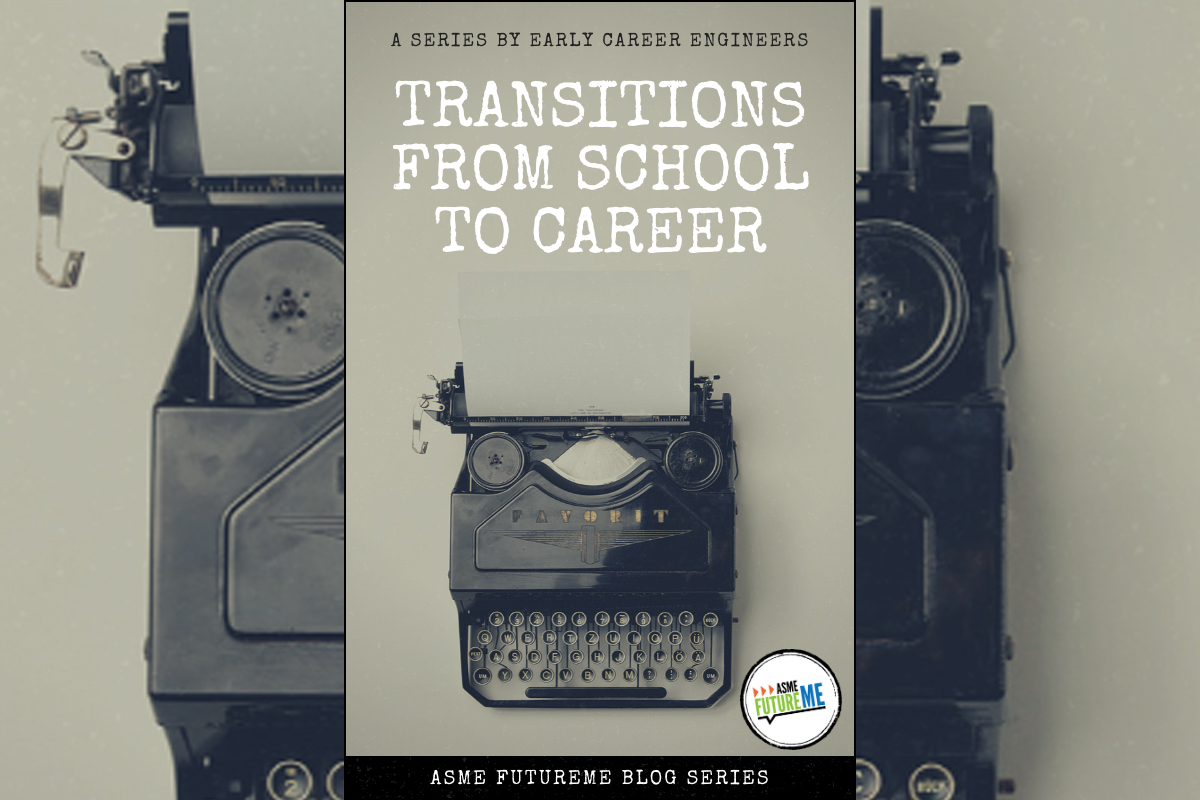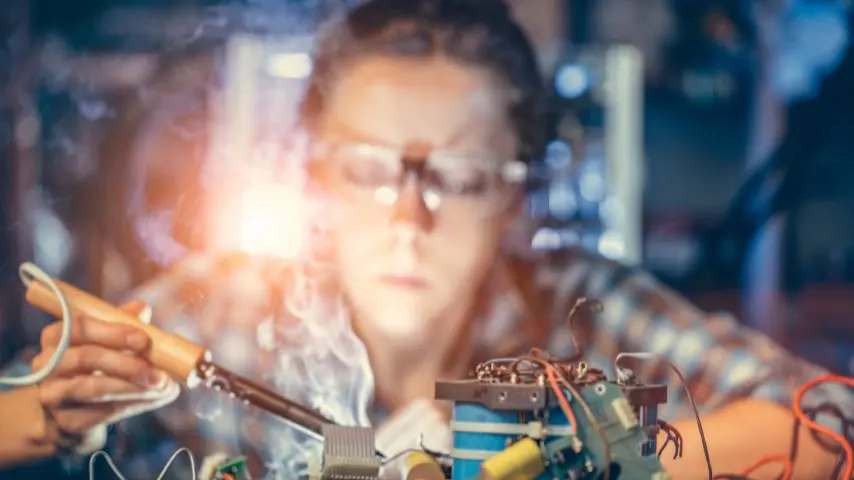Blog: Transitioning from School to Career - Chapter 3
Blog: Transitioning from School to Career - Chapter 3


Finding success in transitioning from college to your career can be overwhelming. This series covers different career paths and offers first-hand experience from a group of early career engineers.
Reflections on Taking a Gap Year and on Going to Graduate School
As you approach the end of your undergraduate work or some other transition in your career, have you considered going to graduate school or taking a gap year? Two years ago I was sitting in exactly that position. I had been accepted to grad school, but I was thinking about taking a gap year. Thankfully I was able to defer grad school for a year and go to Uganda and work on research project with aquaponics through a Fulbright research grant.
The gap year turned out to be the best year of my life. I was able to partner with a vocational school and build two aquaponics systems. Aquaponics is growing fish and vegetables together in water, and I learned so many practical skills about doing engineering in developing countries by building these systems. I learned about sourcing materials, product management, and the importance of merging local practices with traditional western designs. But even more importantly, were the life perspectives and the deep bonds that I made with the people. By living in a mud hut and being able to take part in village life every day, I realized how much livelihood is dependent on the land and on the weather.
I was able to gain a deeper perspective that I couldn't get from my classes, or from a 2-week service trip, or even from working in a normal engineering job. I also learned about the strength of the local people and how they've gone through so much. The school that I was working at was for child mothers who had been traumatized by civil wars in Uganda and South Sudan. Hearing their stories about living through the atrocities of war, about being forced to become child soldiers, about fleeing their homes to live in refugee and IDP camps, or about losing loved ones to malaria and other preventable diseases; these stories were no longer just pictures in the news. I thought before going to Uganda that I wanted to work in development engineering, but after living there I was confident this is what I wanted to do for the rest of my life. I was able to transition that desire into my grad school program, and thankfully even my grad school research has been framed around this initiative.
Grad school is very different than undergrad. Grad school is so much more independent. You have to drive your own research; you're not given very much guidance and you have to be able to figure out what you want to test and figure out what you want to accomplish yourself. You're not really given very many deadlines, so you have to be self-motivated and push yourself to do the work. The homework is also a lot harder than in undergrad. You have to find what equations you're going to use to solve a particular problem and figure out what kind of assumptions are valid in that case and be able to back those up, which is what real life engineering is like anyway. But even the homework is also more independent. At least for me, in undergrad, I did pretty much all my homework with my group of friends. Whereas in grad school, while there are study groups, people often do a lot of the homework themselves on their own and then just discuss the approaches to problems in the study groups. In undergrad, student orgs are a really big thing, but not so much in grad school because people focus a lot more just on their research. You have to read stacks and stacks of the papers and even textbooks, to be able to get the background knowledge in your field. And it sounds kind of intimidating, but if you’re researching something that you're really interested in, it can actually be enriching.
Why and when you should go to grad school? Honestly, when I was applying to grad school I didn't understand the process, and the importance of picking the right program and the right advisor. I wasn't even sure if I should go to grad school. I applied because people told me, “Oh, you're a good student. You should go to grad school.” Now that I'm here, I have a better perspective of the process. The simple reason to go to grad school is to gain advanced knowledge in a particular field. If you want to become an expert in something, then grad school is a good idea. A Ph.D. is usually necessary if you want to teach, or if you want to do research full-time, or if you want to be an expert in a very particular field. A Master's degree gives you great advanced knowledge, and a lot of engineers nowadays are getting a Master’s degree, whether it's a Master of Science with a thesis, or a Master of Engineering, or even an MBA. They're all a good idea. The harder question is, when should you go to grad school? And the answer to that is if you can put your finger on what field you really want to be the expert in, what field you want to read papers on and be the one that is designing new experiments to push the bounds of that field, then you’re ready for grad school. I encourage you to take the time to really understand what area of mechanical engineering you want to focus in before you start applying to grad school. And if you don't know right away, that's okay. You can take some time to work, or do research, or even volunteer if you have the opportunity. You'll still have the drive to be able to continue working in that area. And honestly, the grad students that have practical experience and that are our older often have more impactful research projects.
Spend the time researching your programs. This is the most important part of the process; it even takes more time to research than actually filling out the applications. You want to pick the school based on your advisor, based on your project. You’re going to spend two to five years on this one particular project and many late nights. You want to be passionate about the topic and to be able to develop a good relationship with your advisor. Also realize that a lot of lab websites are not updated. Professors often have projects they're working on or ideas they'd like to start that are not posted online. Find an opportunity to talk with potential advisors, and see what research options are available to you. Your ability to pick a project often depends on the funding situation. Apply for all the scholarships and fellowships that you can. If you can bring your own funding that's not tied to a particular advisor or to a particular project, you'll have a lot more freedom to choose a project that you're really interested in. I've been blessed that I've been able to have funding from NSF and from Berkeley. I was able to start my own project that I was really passionate about.
Research in grad school, it can be hard. It's probably one of the times your life when you're going to work the hardest, but it's also very rewarding. You learn so much so quickly, and you get to have the privilege of sitting in the classroom, listening to professors and people who are the best and brightest in your field teach you these crazy difficult concepts, and you're surrounded by your peers who are also invested in learning. In addition, I would highly recommend a gap year, whether it's a short term job, or a research position, or volunteering. It helps to just have a bit more perspective and experience before transitioning into grad school or into a permanent career position.
About the Author: Paige Balcom is pursuing a career in development engineering and human centered design. A New Hampshire native, she earned a B.S. in Mechanical Engineering and was recognized as Woman of the Year at the University of New Hampshire. She is also passionate about entrepreneurship and appeared on Shark Tank. After graduating, Paige spent ten months in Uganda on a Fulbright grant researching and building aquaponic systems to combat food insecurity. She is currently pursuing a Ph.D. in Mechanical Engineering with minors in Development Engineering and Design at the University of California-Berkeley as a National Science Foundation, Tau Beta Pi, and Berkeley Chancellor’s Fellow. Her graduate research focuses on transforming plastic waste into roofing tiles in developing nations.






